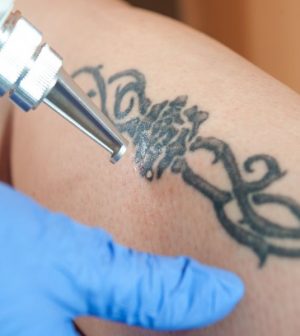- Could Your Grocery Store Meat Be Causing Recurring UTIs?
- Are You Making This Expensive Thermostat Error This Winter?
- Recognizing the Signs of Hypothyroidism
- 10 Strategies to Overcome Insomnia
- Could Artificial Sweeteners Be Aging the Brain Faster?
- Techniques for Soothing Your Nervous System
- Does the Water in Your House Smell Funny? Here’s Why
- Can a Daily Dose of Apple Cider Vinegar Actually Aid Weight Loss?
- 6 Health Beverages That Can Actually Spike Your Blood Sugar
- Treatment Options for Social Anxiety Disorder
FDA Proposes Tougher Rules for Tattoo Providers to Curb Contaminated Inks

Regulators want your next tattoo to be as safe as it is trendy.
The U.S. Food and Drug Administration has issued a draft of new guidance aimed at helping manufacturers and distributors of tattoo inks prevent microbial contamination.
“With about 30% of people living in the U.S. having a tattoo, it’s imperative that the FDA take all necessary steps to help ensure that tattoo inks are free of contamination,” said FDA Chief Scientist Namandjé Bumpus.
“Pathogens or other harmful substances in these inks can cause infections and serious injuries,” she said in an agency news release. “The FDA is issuing this draft guidance to help tattoo ink manufacturers and distributors recognize situations in which tattoo ink may become contaminated with microorganisms and take steps to protect public health.”
The FDA issued a safety alert on tattoo inks in May 2019. It advised consumers, tattoo artists and retailers to avoid using or selling certain tainted inks.
Many people have reported to federal regulators illness caused by contaminated tattoo inks. Testing has found that many sealed tattoo inks in the United States have microbial contamination.
“Unlike most cosmetics, tattoo inks are injected into the dermal layer of the skin, and therefore have the potential to introduce harmful pathogens directly into the body. Because of this, it is particularly important for tattoo inks to be manufactured using methods to ensure a product is safe,” said Dr. Linda Katz, director of the FDA’s Office of Cosmetics and Colors.
“The recommended steps outlined by the FDA in the draft guidance provide manufacturers the information and resources needed to help ensure that tattoo inks are not contaminated.” Katz said in the release.
The recommendations call for testing ink and its pigments, water and solvents for microbial contamination or purchasing these from suppliers who do test their products.
Recommendations include discarding any materials that contain microorganisms of a type or at a level that may be harmful if included in the finished product; ensuring that the manufacturing process does not introduce contamination through cleaning; giving personal protective equipment to workers, and validating sterilization methods.
Those using these components would also need to ensure that the manufacturing process itself does not introduce contamination, the FDA said.
Consumers and health care providers should report adverse reactions from tattoos to MedWatch at 1-800-332-1088 or by contacting the nearest FDA consumer coordinator.
The manufacturer, packer or distributor of cosmetic products, including tattoo inks, whose name appears on the label is required to report serious adverse events to MedWatch, under cosmetic regulations adopted last year, the FDA noted.
The agency will take comments on this draft guidance within 90 days of publication in the Federal Register on Regulations.gov.
More information
Kaiser Permanente has more on infections from tattoos.
SOURCE: U.S. Food and Drug Administration, news release, June 12, 2023
Source: HealthDay
Copyright © 2026 HealthDay. All rights reserved.










